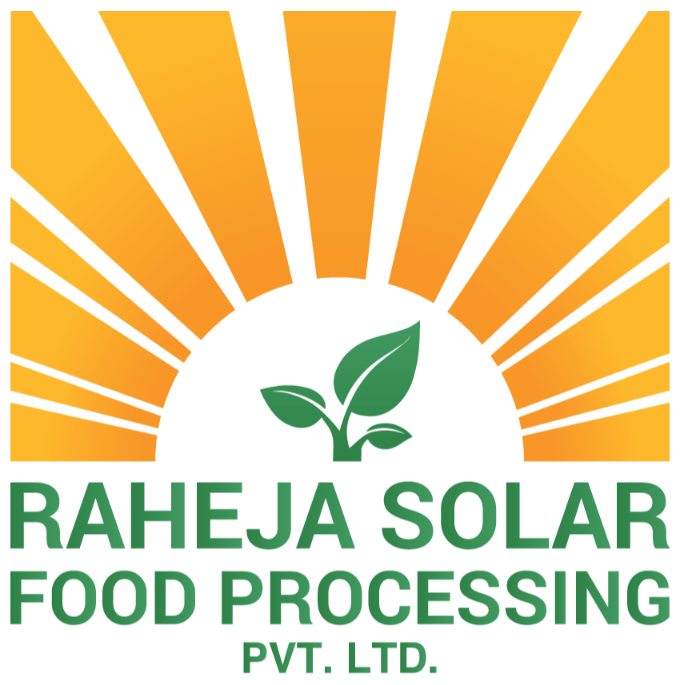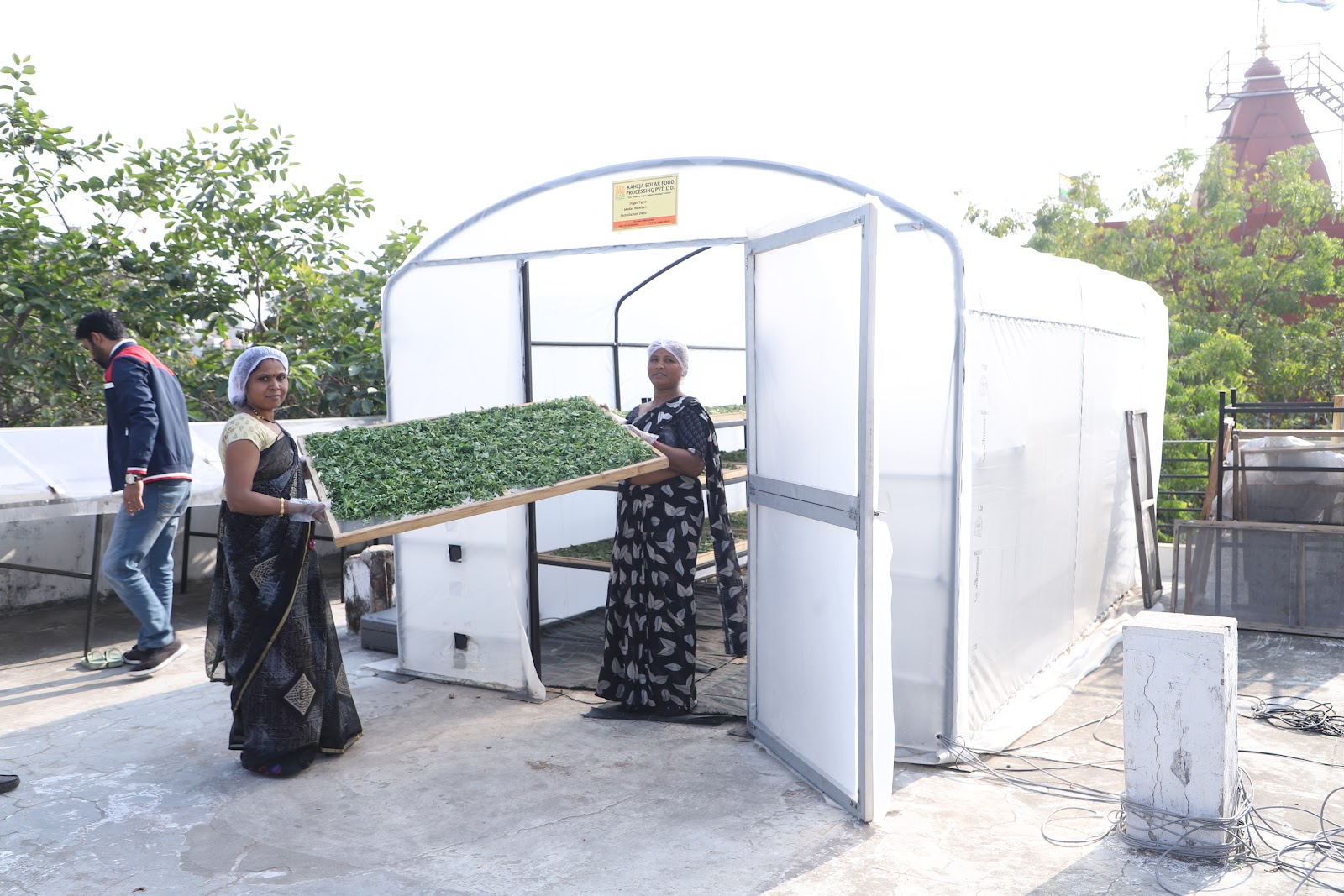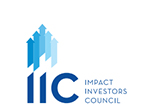|
Action for Impact
Dialogue with Varun Raheja, Co-Founder,
Raheja Solar Food Processing
|
|

1 Raheja Solar Food Processing, with its solar dryers, aims to reduce the food waste challenges faced by most farmers. Currently which are the geographies (in India) that you operate in and how much of your coverage pertains to that of smallholder farmers? Could you walk us through your business model?
|
We operate extensively in key agricultural states like Andhra Pradesh, Telangana, Maharashtra, Uttar Pradesh, Madhya Pradesh, Rajasthan, and Uttarakhand. Our focus is on supporting smallholder farmers who are disproportionately affected by post-harvest losses due to inadequate agricultural supply chains. Our business model revolves around empowering these farmers with solar dryer technology. By doing so, we enable them to preserve their produce, reduce waste, and increase income. Additionally, we facilitate market linkages, ensuring that their dehydrated products reach the appropriate markets at favorable prices.

|
2 Raheja Solar also works on building market access for farmers, once the farm produce has been processed. Given that many agritechnology providers have also started building in a market linkage business segment, could you walk us through the key aspects to consider while doing so?
|
Establishing market access involves ensuring quality standards, transparent pricing, and continuous farmer education. We differentiate ourselves by maintaining trust and strong relationships with market buyers. In addition to this, the traceability of our product and impact on society is an add on. The challenge of margin pressure is real. To address this issue we have opened up collection centers where we collect the processed materials from the farmers and also we are working on small partnerships with local farmers who do all the initial operations needed. This way we have successfully cut down on high operational costs involved in market linkages.
|
3 You also operate on a B2B model, where some of the farm produce that has been processed using the solar dryers is sold to companies. Could you share with us some of the partner organisations that you have in this regard, and what quantum of your total sale gets processed through the B2B sales channel?
|
We have partnered with leading FMCG brands and specialty food manufacturers that prioritize sustainable and natural produce. Key partners include companies in the ready-to-eat meal and health snack segments like Happilo, Chayoos, Ayush foods, Zepto etc. About 40-50% of our processed products are sold through this B2B channel, which includes high-quality dehydrated fruits and vegetables used as natural ingredients in various products.
|
4 We understand that the price range of solar dryers varies from Rs 10,000 for domestic uses and up to Rs 5 lakh for mid-sized. Could you share with our readers your experience on how farmers perceive the price points when it comes to new-age technologies? Do you see the dryers being used by individual farmers or by collectives, as an increasing number of smallholders get organised into groups?
|
Initially, smallholder farmers show hesitance toward investing in advanced technology due to the upfront cost. They always do ground research by visiting other farmers with solar dryers and sometimes investing a small amount at the start. However, once they understand the long-term benefits, such as increased income and reduced waste, their interest grows. We see many small farmers forming cooperatives or SHGs (Self-Help Groups) to jointly invest in shared solar dryers. These groups are often observed to have a fair financial ability to invest in any new agritech. Raheja Solar actively facilitates financial access by collaborating with banks and NBFCs to offer installment-based payment options, making the technology more affordable.
|
5 As you look to export your products to Indonesia, Bhutan, and Africa, what is the demand that you are experiencing from these economies? What do agritech entrepreneurs need to keep in mind, while expanding their reach beyond India and equipping themselves to cater to other developing countries?
|
There’s a growing demand for natural, preservative-free dried products in these markets. Indonesia, Bhutan, and parts of Africa value the quality and sustainability of solar-dried goods. Agritech entrepreneurs should focus on understanding local consumer needs and preferences. Building strong logistics networks is crucial to ensure timely delivery, and entrepreneurs should also invest in product customization to suit the dietary habits and tastes of each target market.
|
6 Could you share a little about your recent MoU with the Andhra Pradesh Food Processing Society (APFPS)? What are some of the key outcomes that you seek to address through such a partnership and how is the government partnership enabling ease of access to the target market?
|
Our MoU with APFPS aims to leverage governmental support for increasing access to solar dryers among small and medium-sized farmers. We plan to set up community drying hubs and provide farmer training programs. This partnership will help us streamline market access and create a replicable model for other states. We anticipate that these initiatives will enable farmers to increase their productivity and income while promoting sustainable practices.
|
7 Could you share a little about your upcoming expansion plans?
What is the support or capital requirement that you seek from investors as you grow your business?
|
Our expansion strategy includes scaling our collection and processing hubs, with the goal of increasing our outreach by 30% over the next two years. We are also working on diversifying our product range with more solar-powered innovations. We seek strategic investment from partners aligned with our sustainability mission. The funds will support infrastructure scaling, R&D, and strengthening market linkages to maximize the impact on farmers’ livelihoods.
|
|
|
Varun Raheja is a visionary social entrepreneur and accomplished mechanical engineer dedicated to revolutionizing agriculture for small farmers. At just 20, he co-founded Raheja Solar Food Processing with his mother, creating an affordable solar dryer system that empowers rural farmers to preserve produce sustainably. Leveraging his Sindhi heritage and engineering expertise, Varun’s innovation combats food waste, boosts farmer income, and ensures a reliable supply chain for food brands. His impact spans over 65000+ farmers and more than 5,000 jobs created(directly and indirectly), making him a pioneer in transforming India’s food landscape through sustainability and cutting-edge technology.
About Raheja Solar Food Processing
Raheja Solar Food Processing is revolutionizing agriculture with cutting-edge solar drying technology. Our proprietary solar dryers enable farmers to preserve their fresh produce naturally, retaining color, taste, and nutrition without preservatives. By integrating sustainable practices with economic empowerment, we reduce post-harvest losses and uplift rural communities. Our commitment includes direct market linkages, hands-on training, and partnerships with local SHGs, FPOs, and NGOs. With ICAR-approved technology and features like remote monitoring, we ensure high-quality dried products that cater to premium, health-conscious brands while promoting an eco-friendly and self-sufficient future for farmers.
|
|
About Impact Investors Council:
Impact Investors Council, India (IIC) is a member-based national industry body formed with an
objective to build and strengthen the impact investing eco-system in India. To know more about our work visit https://iiic.in or reach out to secretariat@iiic.in
|
Disclaimer: Data and Information in this newsletter is made available in good faith with the exclusive intention of helping market and ecosystem players, policymakers and the public build a greater
understanding of the Indian impact investing market. The data is collated from sources believed to be reliable and accurate at the time of publication. Readers are urged to exercise independent judgment and diligence in the
usage of this information for any investment decisions
Some of the information provided in this newsletter is supplied by third parties. It is important that all users understand that third party information is not an endorsement of any nature and has been put together with the
sole purpose of benefiting stakeholders.
|
| Unsubscribe |
|
|
|



